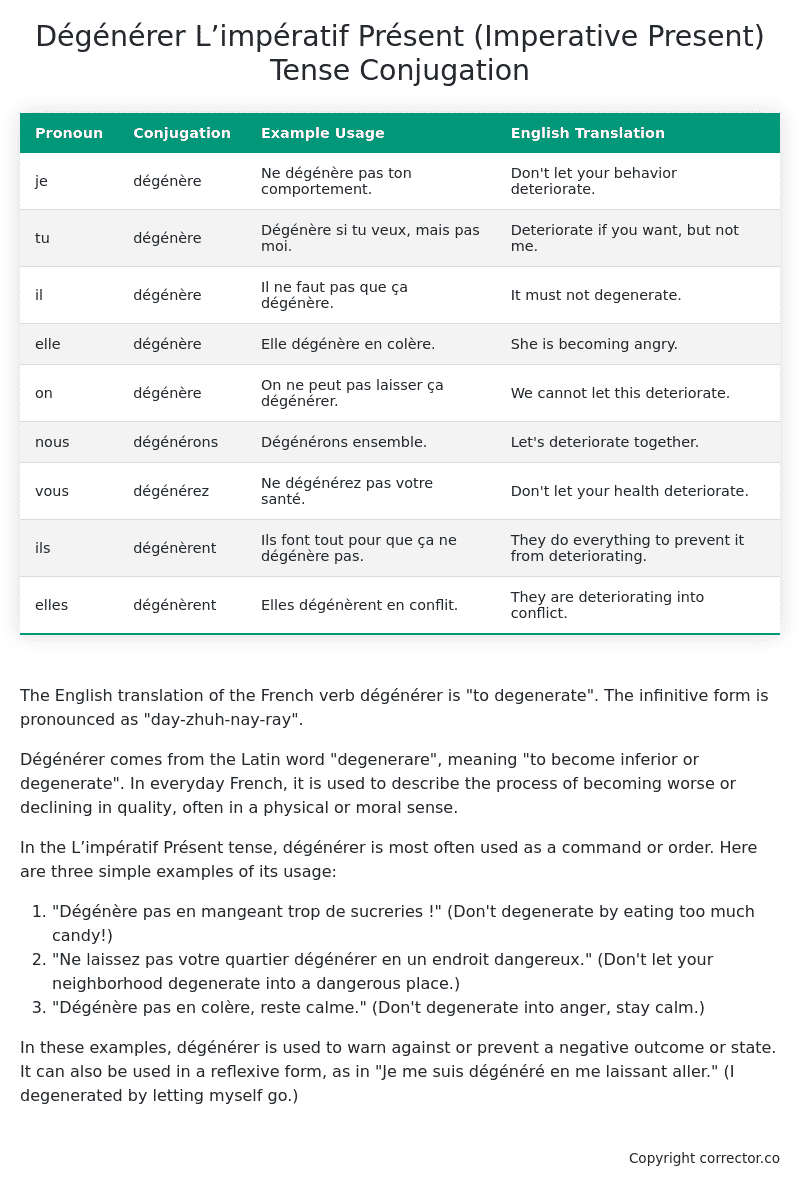L’impératif Présent (Imperative Present) Tense Conjugation of the French Verb dégénérer
Introduction to the verb dégénérer
The English translation of the French verb dégénérer is “to degenerate”. The infinitive form is pronounced as “day-zhuh-nay-ray”.
Dégénérer comes from the Latin word “degenerare”, meaning “to become inferior or degenerate”. In everyday French, it is used to describe the process of becoming worse or declining in quality, often in a physical or moral sense.
In the L’impératif Présent tense, dégénérer is most often used as a command or order. Here are three simple examples of its usage:
- “Dégénère pas en mangeant trop de sucreries !” (Don’t degenerate by eating too much candy!)
- “Ne laissez pas votre quartier dégénérer en un endroit dangereux.” (Don’t let your neighborhood degenerate into a dangerous place.)
- “Dégénère pas en colère, reste calme.” (Don’t degenerate into anger, stay calm.)
In these examples, dégénérer is used to warn against or prevent a negative outcome or state. It can also be used in a reflexive form, as in “Je me suis dégénéré en me laissant aller.” (I degenerated by letting myself go.)
Table of the L’impératif Présent (Imperative Present) Tense Conjugation of dégénérer
| Pronoun | Conjugation | Example Usage | English Translation |
|---|---|---|---|
| je | dégénère | Ne dégénère pas ton comportement. | Don’t let your behavior deteriorate. |
| tu | dégénère | Dégénère si tu veux, mais pas moi. | Deteriorate if you want, but not me. |
| il | dégénère | Il ne faut pas que ça dégénère. | It must not degenerate. |
| elle | dégénère | Elle dégénère en colère. | She is becoming angry. |
| on | dégénère | On ne peut pas laisser ça dégénérer. | We cannot let this deteriorate. |
| nous | dégénérons | Dégénérons ensemble. | Let’s deteriorate together. |
| vous | dégénérez | Ne dégénérez pas votre santé. | Don’t let your health deteriorate. |
| ils | dégénèrent | Ils font tout pour que ça ne dégénère pas. | They do everything to prevent it from deteriorating. |
| elles | dégénèrent | Elles dégénèrent en conflit. | They are deteriorating into conflict. |
Other Conjugations for Dégénérer.
Le Present (Present Tense) Conjugation of the French Verb dégénérer
Imparfait (Imperfect) Tense Conjugation of the French Verb dégénérer
Passé Simple (Simple Past) Tense Conjugation of the French Verb dégénérer
Passé Composé (Present Perfect) Tense Conjugation of the French Verb dégénérer
Futur Simple (Simple Future) Tense Conjugation of the French Verb dégénérer
Futur Proche (Near Future) Tense Conjugation of the French Verb dégénérer
Plus-que-parfait (Pluperfect) Tense Conjugation of the French Verb dégénérer
Passé Antérieur (Past Anterior) Tense Conjugation of the French Verb dégénérer
Futur Antérieur (Future Anterior) Tense Conjugation of the French Verb dégénérer
Subjonctif Présent (Subjunctive Present) Tense Conjugation of the French Verb dégénérer
Subjonctif Passé (Subjunctive Past) Tense Conjugation of the French Verb dégénérer
Subjonctif Imparfait (Subjunctive Imperfect) Tense Conjugation of the French Verb dégénérer
Subjonctif Plus-que-parfait (Subjunctive Pluperfect) Tense Conjugation of the French Verb dégénérer
Conditionnel Présent (Conditional Present) Tense Conjugation of the French Verb dégénérer
Conditionnel Passé (Conditional Past) Tense Conjugation of the French Verb dégénérer
L’impératif Présent (Imperative Present) Tense Conjugation of the French Verb dégénérer (this article)
L’infinitif Présent (Infinitive Present) Tense Conjugation of the French Verb dégénérer
Struggling with French verbs or the language in general? Why not use our free French Grammar Checker – no registration required!
Get a FREE Download Study Sheet of this Conjugation 🔥
Simply right click the image below, click “save image” and get your free reference for the dégénérer L’impératif Présent tense conjugation!

Dégénérer – About the French L’impératif Présent (Imperative Present) Tense
Usage
Giving commands
Making requests
Offering advice
Expressing desires
Conjugation Formation
Interactions with other tenses
Want More?
I hope you enjoyed this article on the verb dégénérer. Still in a learning mood? Check out another TOTALLY random French verb conjugation!


